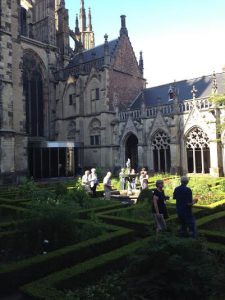Anthony Burgess at the International James Joyce Symposium
-
Burgess Foundation
- 22nd July 2014
-
category
- Blog Posts
The International James Joyce Foundation is the premier forum for scholars of Joyce, and its biannual symposium is a major event in the academic calendar. The 2014 event was held in Utrecht, Netherlands and spread over a week, starting with Bloomsday celebrations on June 16th.
Only once before has the symposium featured a panel on Joyce and another writer (when Kafka had that honour in Prague) so it was gratifying that the panel on Joyce and Burgess proposed by members of the Burgess Foundation was accepted by the organisers.
Our team comprised Yves Buelens as head coach, with Jim Clarke, Alan Shockley and Rob Spence as speakers. We were welcomed warmly by the Joyceans, and enjoyed the historical ambience of the town and the university very much. The 1713 Treaty of Utrecht was signed in the building we were using, so it was inspiring to be in such a historic setting.
The symposium attracted many of the leading Joyce scholars, and it was fascinating to witness some very erudite debates on matters of tiny textual detail. Burgess would have loved engaging with these people, and one could imagine him smoking a Schimmelpenninck in the monastery gardens where we had our coffee breaks, holding forth on the intricacies of Finnegans Wake. And those scholars certainly know their Joyce, frequently referring to passages by their page numbers in the standard edition. The topics were suitably arcane: as someone remarked –‘only at a Joyce conference could you have three papers on silence.’ Some of the more esoteric papers dealt with matters such as the role of cheese in Joyce, and the frequency of particular phrasemes in Joyce’s works.
Keynote speaker Professor Geert Lernout of the Antwerp Joyce Center paid tribute in his talk to the late Dr Alan Roughley, founding director of the Burgess Foundation and a noted Joyce scholar, and the audience responded with applause. Our aim in the panel was to outline some of the many connections between Burgess and Joyce, and to promote further study. Rob Spence explored some of the ways in which Joyce and Burgess reflected the popular cultures of their times. Alan Shockley showed how Burgess’s representation of Shakespeare, particularly in Nothing Like the Sun, was filtered through Joycean visions of Shakespeare, particularly Stephen Dedalus’s theories in Ulysses. Jim Clarke’s paper considered Joyce’s attempts to incorporate contrapuntal methodology into episodes of Ulysses, and his later experiment using a radically different methodology in Finnegans Wake, relating these experiments to Burgess’s work in various novels.
The panel was well received by an audience that included some very prominent Joyce scholars. Finn Fordham, author of the important study Lots of Fun at Finnegans Wake declared it the most stimulating panel he had attended. Several panel attendees approached the panellists to ask about the Burgess Foundation and resources for Burgess study. We are to delighted to have already been given a green light for participation when the symposium reconvenes in London in 2016.
Rob Spence



